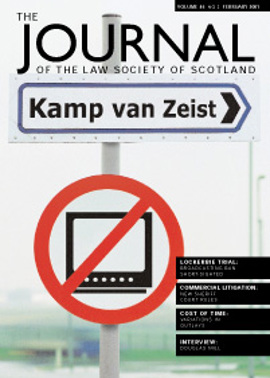Promoting paralegals
Since the first tenuous gathering at the Ingram Hotel in Glasgow in 1993, the Scottish Paralegal Association has progressed to its present position fostering the continuing education of paralegals and acting as an unofficial employment register.
For current Association President Lynda Graham and the committee, offering paralegals the chance to engage in continuing education is the key. “Paralegals are experienced fee–earners in their own right and I think over the years we have allayed the fears of some solicitors that we might pose a threat, particularly to trainees. We are now viewed as crucial back-up to the services offered by solicitors. Indeed we can often be of assistance to trainees who maybe haven’t had that much experience in dealing with people in client situations.
“The primary role of the Association is to encourage paralegals to improve their skills. We emphasise that qualifications are not essential, but requisite experience is in order to be an accredited paralegal”, said Lynda Graham.
Crucial to the recent progress of the Association has been recognition by The Law Society of Scotland, particularly in organising Update seminars specifically for paralegals in areas such as trust and executries and conveyancing, both of which were oversubscribed.
“There is an eagerness among paralegals to develop their skills and become even more useful to firms. In the last few years firms have started to view paralegals as critical back-up to solicitors.”
Nevertheless Lynda Graham stresses it is important for members and clients to remember that “paralegals are not solicitors”.
“Even where we are given autonomy to deal with the client base, it’s vital to be open with clients and explain the limits to the service you can offer, and if they prefer to deal only with a solicitor you must respect that.”
Whether it can be seen as a trend is open to debate, but some firms are opting for secretary-free offices, preferring to have solicitors type their own letters and run their own diaries. Does the Association view this either as a threat to non-solicitors within legal firms or a vindication of the skills improvements promoted?
“It’s largely about having the confidence and the time to make the commitment to take the step to reach paralegal level. People who give up their nights to study and pursue new skills should be commended and encouraged by the firms who employ them, though many find it hard to find the time due to family commitments”, said Lynda Graham.
Aping the solicitor profession, the Association have also introduced CPD requirements (still voluntary, though making them compulsory is under discussion), in this instance ten hours a year, a Code of Conduct , and satellite groups in most regions.
“The benefit of local groups is networking, sharing ideas and offering advice and support when dealing with difficult clients.”
For many, including Lynda Graham, taking their role still further involves doing the part-time LLB at Strathclyde University. A number of paralegals have gone on to qualify as solicitors.
Honorary President and founding member Professor Ross Harper said: “I was proud to play a part in the founding of the Paralegal Association and even prouder to be Honorary President.
“At Strathclyde University we recognise the importance of training those engaged in the more mundane aspects of the law such as typing and whose potential was often not realised. We were not surprised many of our students showed abilities equivalent to our full-time students.
“In my opinion there is a vast reservoir of talent working in law offices throughout the country. Many secretaries, but for family or other circumstances, would have been able to participate as students and become lawyers. Any encouragement we can give is hopefully welcomed. Our establishment of the Paralegal Association was designed to give sharper focus to this area of legal practice and provide a meeting point and forum for discussion.”
In this issue
- President’s report
- The Lockerbie trial and article 10
- Sheriffs reclaim a role in commercial actions
- Why become a solicitor if you want to do banking?
- Promoting paralegals
- Code cracks unified regulation
- Substitute land and charge certificates
- Legal responsibilities for gas safety
- Robust self analysis the key to change
- Don’t trust your memory
- Nice Summit: the road to enlargement
- Book reviews
- Around the houses






